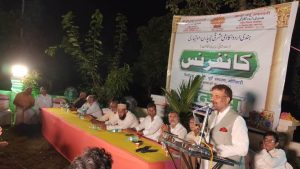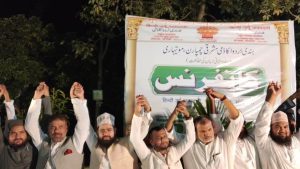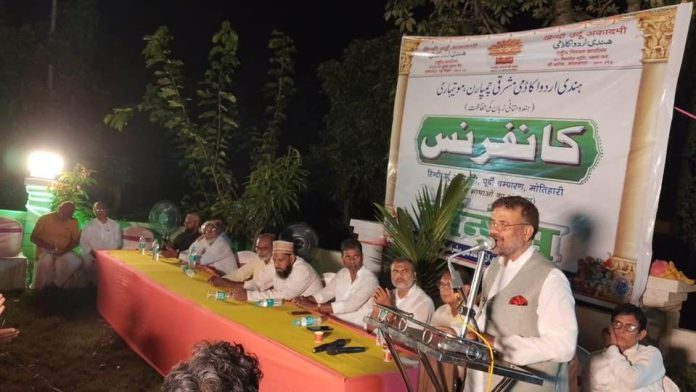Language unity was the theme in Motihari where leaders urged the government to declare Hindi the National Language and Urdu the Second National Language. The Hindi Urdu Academy pledged new initiatives to revive reading culture and safeguard Indian languages.
By Qalam Times News Network
Motihari, Bihar | September 29, 2025
Language and National Identity

Language took center stage at a district-level seminar and mushaira held in Imad Patti, Chakia, under the banner of the Hindi Urdu Academy, New Delhi. Presiding over the event, Academy Chairman and Urdu leader Shamim Ahmed emphasized that both Hindi and Urdu are integral to India’s cultural heritage. “A language has no religion,” he declared, accusing colonial powers of sowing division by attaching religious labels to Hindi and Urdu.
Ahmed further demanded that Hindi be granted the status of National Language, while Urdu be recognized as the Second National Language. He stressed that a nationwide movement had already begun from the historic soil of Champaran to achieve this goal. The Academy also announced plans to establish libraries across regions to promote the reading culture and ensure accessibility to literature in all languages.
Concerns Over Urdu’s Decline
Speakers expressed deep concern about the gradual distancing of people from Urdu. JDU leader Mohammad Dilkash noted that parents increasingly prefer missionary schools, limiting children’s exposure to Urdu. He also lamented the declining readership of Urdu newspapers and journals, calling it a threat to the survival of the language.
Poet Farogh Alam Jami highlighted the lack of Urdu teachers in schools, including institutions originally founded as Urdu schools. Congress leader Shuja Gandhi said: “Our conversations remain incomplete without Urdu. Promoting Urdu literature and culture must be a priority.”
Language Beyond Religion

Dr. Waliullah Qadri, a lecturer at Government College Chapra, praised Shamim Ahmed as a “rare gem” and recalled historic figures like Maulana Betab Siddiqui who nurtured Urdu during earlier struggles. He underscored that language should never be tied to religion, referencing Amir Khusro, the first poet of Hindavi (later known as Urdu-Hindi).
Professor Kaleem Ahmed echoed the same sentiment, urging parents to instill love for Indian languages in their children. Haider Imam Ansari, District Urdu Language Cell Officer, revealed that Urdu staff had visited nearly 500 schools, distributing Urdu books and installing boards in the language, proving that genuine effort always yields results.
Practical Steps for Revival
Cleric Maulana Adil Husain Misbahi encouraged parents to prioritize Urdu education for their children and to use the language actively in daily speech. Comrade Ishtiyaq Alam, in his vote of thanks, said the protection of all Indian languages is the organization’s central mission, and success would depend on collective commitment.
Mushaira Highlights
The evening also featured a well-attended mushaira, chaired by senior journalist Uzair Anjum and hosted by district anchor Aditya Manas. Poets including Zafar Habibi, Ruhul Haq Hamdam, Samiullah Champarni, Dr. Tahiruddin Tahir, Waris Islampuri, Dr. Saba Akhtar Shokh, and others captivated the audience with their verses.
Hundreds of attendees, including prominent scholars, clerics, political figures, and citizens, added weight to the gathering, reaffirming Champaran’s historic role as a hub for cultural and linguistic movements.







